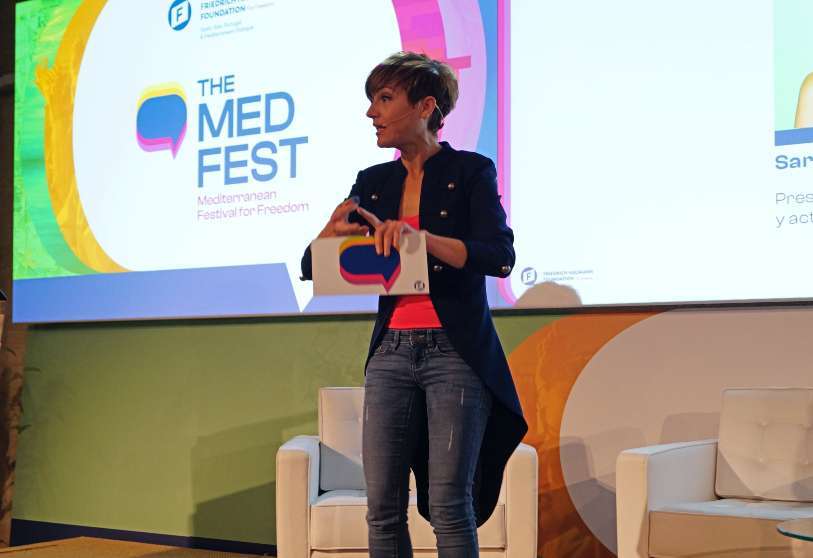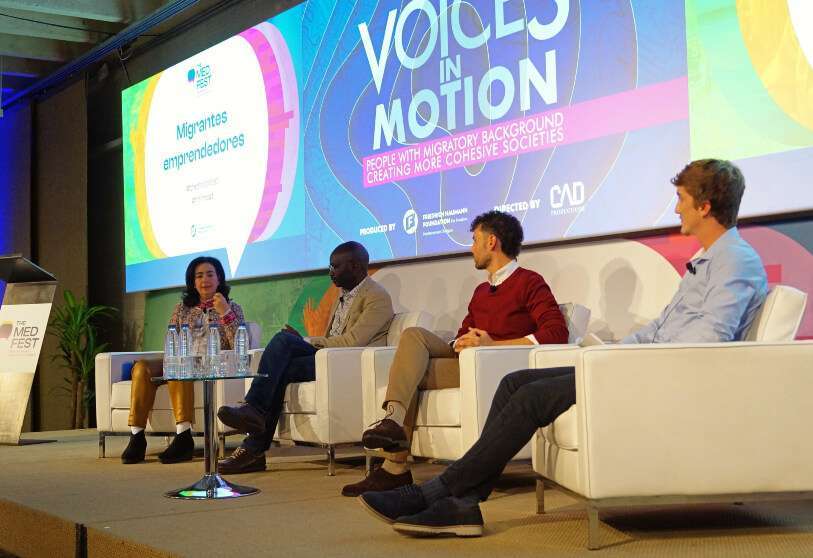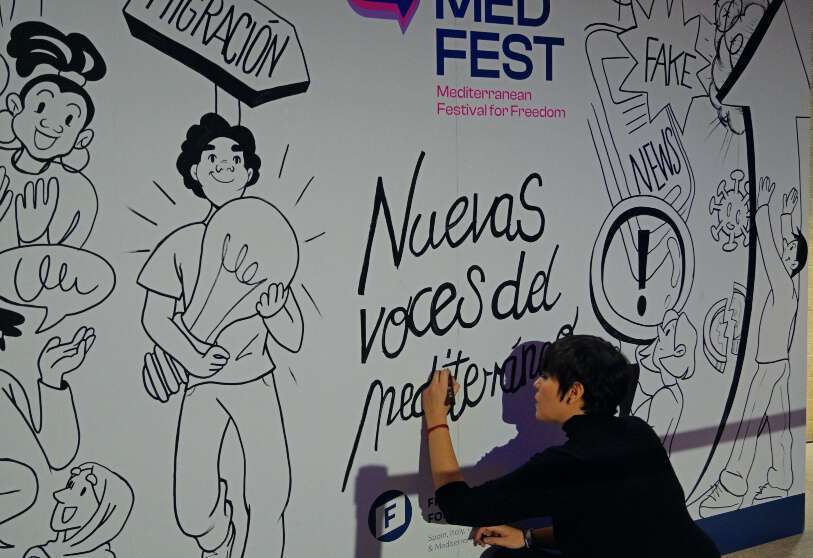The Friedrich Naumann Foundation commits to the younger generation at the Med Fest

"You don't have to be a whale to belong to Greenpeace", said José Ignacio Pichardo, PhD in Social Anthropology from the Complutense University, in one of the phrases that best summed up the motivations of the participants in the Med Fest. You don't have to belong to the LGTBIQ collective to defend the rights of the people who make it up. You don't have to be of African descent to demonstrate against racism. You don't have to be young to understand the situation that the new generations - the "glass generations" - are facing.
These were just some of the main premises of the first edition of 'The Med Fest' (Mediterranean Festival for Freedom) organised by the Friedrich Naumann Foundation for Freedom on 24 November at the Official College of Architects of Madrid (COAM). A debate scenario where the will to get involved in the future of Europe -and of the Mediterranean region-, as well as the desire to be an active part of the political and social changes of the future, brought together dozens of young and not so young people to advocate for the defence of diversity.

The Med Fest thus aimed to become "a meeting point for young people to address current affairs and anticipate problems by offering solutions from experts, because the young people of today are the future of tomorrow," said the director of the Friedrich Naumann Foundation (FNF) office in Madrid, David Henneberger. "We want to stimulate a debate that focuses on more positive aspects," he explained in his welcoming remarks, noting that the crises caused by the pandemic, the war in Ukraine, rising inflation and the threat of climate change have made the Mediterranean dialogue on the future "depressing".
With this in mind, the television presenter and comedian Sara Escudero was in charge of directing the main thread of the ceremony on the basis of humour and proximity, and did so after Henneberger's speech together with the Head of Political Affairs of the German Embassy in Spain, Pamela Preusche, who compared the participation of the new generations involved in the Med Fest with other political meetings of a much higher level, such as the Regional forum that was being held that same day in Barcelona between the foreign ministers of the Union for the Mediterranean.

The festival gave way to the first of four presentations, a panel on diversity in which renowned speakers such as Adriana Boho, activist, writer and television stylist; Sylvia Jarabo, managing partner of Promising Women, of the Diversity Foundation; and José Ignacio Pichardo, PhD in Social Anthropology and professor at the UCM; and moderated by the CEO of Shaping The New and ambassador #FemaleForward, Eva Díaz, addressed the value of diversity on a personal, social and business level. Are we a diverse society? The answers were, unsurprisingly, diverse. Afro-descendant activist, Adriana Boho, felt that no, as a society we were failing the subject. The professor from the Complutense University, on the other hand, gave a score of 7.5.
However, if there was one thing that all speakers agreed on, it was the importance of education and the positive projection of ethnically, culturally, generationally or gender diverse and heterogeneous teams in the economic and business environment. At the same time, the focus was put on cultural barriers and the invisibilisation of difference as the main obstacles to a real diversity that - in line with the politically liberal postulates of the Naumann Foundation - rests on the basis of the total freedom of individuals.

Afterwards, the festival gave way to a panel which, moderated by the economist and young entrepreneur Jorge Llorente, screened the documentary "Voices on the move" and focused on migration movements and entrepreneurship by these migrants. Fatima Sounssim, president of the Orientalia Cultural Association; Abdouyale Fall, doctor and founder of the Maingate Association; and Pablo Malaví, founder and president of the Gay Men's Choir of Madrid, debated the situation of migrants in the economic and business scenario of the countries where they arrive.
"Let's not think that the migrants who arrive here arrive to start a business. They have already started a project before they arrive. They have already started a business. And they have already risked the greatest capital they have: their lives", said Abdouyale Fall after emphasising the qualifications of the people who arrive in Spain, and in the Mediterranean region in general, and which are often made invisible, causing a minor impact on the processes of change due to diversity.

The round table "Triple Crisis Generation", with the participation of Sebastián Ibarra González, member of the Demos Association of the Carlos III University of Madrid; and Jorge Galindo, Doctor in Sociology and Deputy Director of EsadeEcPol; both moderated by the communicator and environmental activist, Paula González; was also the platform for the screening of the trailer of the documentary "Double Crisis Generation".
A third debate highlighted the differences between the new generations in relation to the generations that preceded them, and pointed to the change in the concepts of "progress", "development" and "life project" between young people and their parents' or grandparents' generation. However, Sebastián Ibarra González, the speaker representing the youth community, did not hesitate to stress the importance of this crisis "as a great opportunity to accelerate the changes that society needs and to guarantee the maximum benefit for the greatest number of people".

Finally, the interventions of Paula González; Enrique Álex, traveller and LGTBIQ rights activist; and Lucía Mbomio, writer and journalist; all moderated by the strategy, innovation and design consultant, Valentín Garal; focused on the rise of such fashionable issues as disinformation, fake news and the rise of populism. One of the tables that aroused most expectation and debate among the attendees. "Right now we find ourselves in fertile ground for the arrival of fake news, and there are a lot of channels through which it can enter," said Mbomio, who argued that the "contextualisation" of all information and news is fundamental for dealing with this situation. At the same time, all agreed on the obstacle posed by the precariousness of professions such as journalism and communication.

The Med Fest came to an end, late into the night, in a space of relaxation and proximity with the creation of a live mural: "The mural of the Mediterranean", by the illustrator and creative director Marta Chicote Zorita, nicknamed Chicotown; while DJ Marco Llorente provided the musical touch to the farewell.








